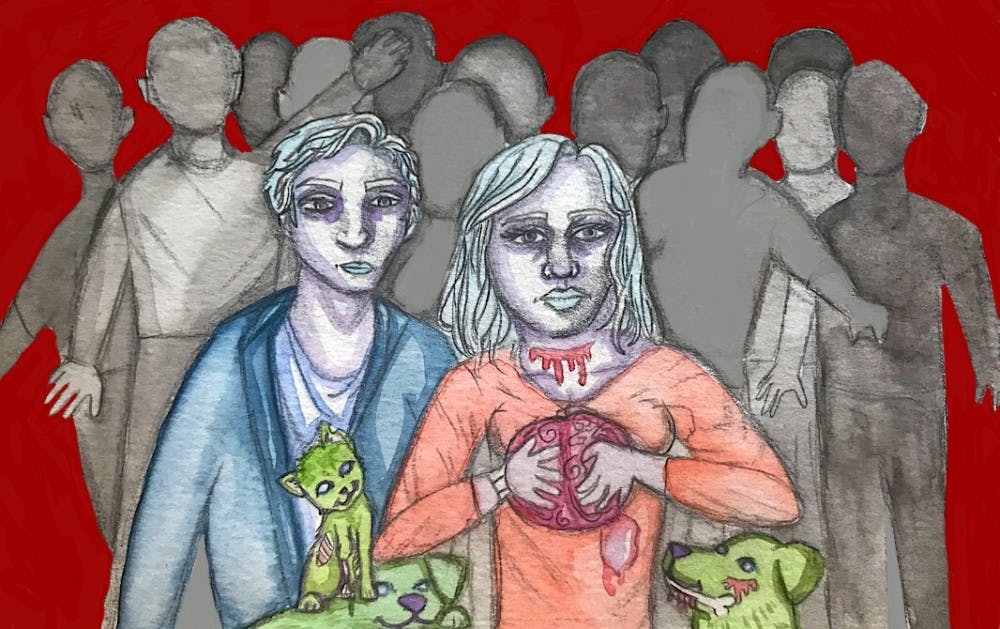Zombies are a common staple of Halloween, horror movies and "The Walking Dead," but they're also helping to build a new, innovative academic conference.
The Zombie Apocalypse Medicine Meeting is an evolutionary biology meeting turned interdisciplinary conference analyzing the undead. This includes real-life "zombification" and preparing for the extreme environments of a zombie apocalypse in order to adapt complex, jargon-filled science into a more digestible and fun format.
Planning for the 2018 conference started in 2016. The conference was planned by ZAMM conference chair Athena Aktipis, an ASU assistant psychology professor and director of the interdisciplinary cooperation initiative, and organizing committee member Joe Alcock, a University of New Mexico associate professor of emergency medicine.
Aktipis said ZAMM is presenting fairly complex scientific studies in ways that can be digested by many people rather than just specialists like how fetal cells manipulate mothers' bodies, how parasites control hosts and how humans manipulate others.
“There’s so much science that is so cool and so interesting, and there’s absolutely no reason why it should be presented in a boring way because it's amazing,” she said.
However, ZAMM is not entirely science-based. There is a key focus on bringing in the arts and humanities as well. The conference hosted a variety of scientists and evolutionary psychologists, but also brought in artists, novelists, filmmakers and even a peer-reviewed rapper.
Emily Zarka, an ASU faculty associate and a part of the ZAMM planning committee, worked on three panels at the conference. She is a self-proclaimed undead monster expert hosting her own show on PBS Digital Studios titled "Monstrum."
“It's mostly STEM-based, however I represent the humanities portion of it and I think that’s one of the great things about this conference is we’re taking an idea, a concept that’s broad enough that lots of different fields, even the public can get into it,” Zarka said.
Zarka participated in the panel discussing the 50 year anniversary of George Romero’s "Night of the Living Dead," Mary Shelley's novel "Frankenstein" and how society makes parallels between zombies and the military.
“We had the public lecture with Max Brooks, the writer of 'World War Z' and 'Zombie Survival Guide,' which was amazing. He gave a great talk and was very inspiring and relevant; honestly all the plenaries coming up are fantastic,” she said.
ZAMM uses zombies to frame serious conversations in a light-hearted way. Aktipis said the concept of breaking science into categories is artificial and prevents cross interactions which can help solve problems.
“If we’re going to effectively deal with the complex problems that we have today, we need to have not just interdisciplinary engagement and involvement, but we need to help create an infrastructure for interdisciplinary conversation so that we can leverage collective knowledge,” Aktipis said.
Alcock said he originally envisioned a conference on evolutionary medicine, but the concept greatly evolved when zombies joined the equation.
“We decided to throw open the flood gates and bring in everything, and so we have disaster medicine, ballistics, SWAT medicine, bacteriology, virology like rabies and sessions on a variety of different topics for the week,” Alcock said.
For example, one of the events discussed snake bites and the idea of cutting off a limb to prevent the spread of a virus throughout the body. The hosts even had volunteers cut apart a sheep leg to demonstrate the process.
Pamela Winfrey, an ASU scientific research coordinator and ZAMM organizing committee member, helped to bring in the artistic side of the conference.
“I find the conversations between artists and scientists more interesting than the ones between scientists and scientists or artists and artists,” Winfrey said. “That relationship is a very stimulating and dynamic one. When you add art to something like this, it allows someone to feel and experience the academic conference.”
David Buss, psychology professor at the University of Texas at Austin, attended the conference on an invitation from Aktipis and hosted a session.
“Most academic conferences are formulaic: they invite experts in a particular area, but (Aktipis) has artists, rap artists, people from the humanities, scientists who study pregnancy and mother-fetus conflict, so it’s really a wide range," Buss said. "So what appealed to me was just how intellectually stimulating and fun it’d be.”
Buss even said this model of pulling in different disciplines has great potential for all future academic conferences.
The conference is held every two years with the first taking place Oct 18 to 21, 2018. The next event is scheduled for October 15 to 18, 2020 and will take place again in the Memorial Union at ASU.
Aktipis said that, tentatively, the 2020 meeting’s theme will be how sex and technology relates to zombies.
“This idea of how do organisms evolve to manipulate other organisms is a central issue in the evolution of parasitism, infectious diseases manipulating their host, cooperation and conflict where individuals manipulate each other for mutual benefit or harm,” Aktipis said. “This idea of a zombie as an entity that is trying to control another entity cuts across so many different kinds of systems.”
Reach the reporter at egilchr1@asu.edu or follow @Ethan_G45 on Twitter.
Like The State Press on Facebook and follow @statepress on Twitter.




